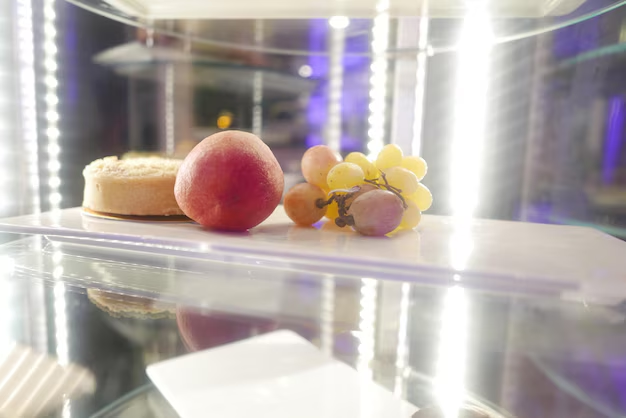The Mystery of Peaches: Can They Ripen in the Refrigerator?
Few things rival the satisfaction of biting into a perfectly ripe peach, with its juicy flesh and sweet aroma. However, achieving that perfect level of ripeness can be elusive, especially when you’re trying to preserve your peaches until you're ready to enjoy them. A common question arises in many kitchens: Can peaches ripen in the refrigerator? Let’s dive into this intriguing topic, unravel the science behind peach ripening, and explore practical storage methods to ensure you enjoy your peaches at their best.
🌱 Understanding Peach Ripening
To explore whether peaches can ripen in the refrigerator, it's essential to first understand the process of ripening itself. Ripening is a natural process in fruits involving biochemical changes that affect texture, flavor, color, and nutritional value.
The Role of Ethylene
Peaches, like many other fruits, produce a natural plant hormone called ethylene. Ethylene plays a crucial role as a signaling molecule that regulates the ripening process. When a peach ripens, ethylene increases the fruit’s sugar content, softens its flesh, and enhances its aroma and color.
Climacteric vs. Non-Climacteric Fruits
Fruits are often categorized into two types based on how they ripen:
Climacteric fruits can ripen after being harvested. They witness a significant increase in ethylene production which continues the ripening process off the plant. Peaches fall into this category alongside bananas, apples, and tomatoes.
Non-climacteric fruits do not ripen after picking and include strawberries, grapes, and citrus fruits.
❄️ Refrigeration and Ripening: What Happens?
Now that we have a baseline understanding of how peaches ripen, let’s address whether they can continue this process in the refrigerator.
The Effect of Cold Temperatures
Cold temperatures in refrigerators slow down metabolic processes by reducing ethylene production. While this can be beneficial for storing fruits that are already ripe by prolonging their shelf life, it can inhibit the ripening of fruits like peaches if they have not ripened yet.
- Peaches should ideally ripen at room temperature, where ethylene production is unhindered. Refrigerator storage is better suited for already ripe peaches to delay over-ripening and spoilage.
Practical Implications
Placing an unripe peach in the refrigerator may stall its ripening process indefinitely. You may notice a firm texture and lack of sweetness if consumed prematurely from refrigeration. If you have peaches that are still firm like a rock, allow them to sit on your kitchen counter for proper ripening.
📦 Best Practices for Storing Peaches
To ensure your peaches reach peak sweetness and juiciness, let's discuss a few storage strategies.
Ripening Peaches Naturally
Room Temperature: Allow peaches to ripen naturally at room temperature. Place them in a single layer away from direct sunlight, which can cause them to overripen.
Paper Bag Trick: To speed up ripening, place peaches in a paper bag, which traps ethylene gas. Adding another ethylene-producing fruit like an apple or banana can expedite the process.
Refrigerating Ripe Peaches
Once your peaches have ripened to perfection, refrigeration becomes your ally to extend their shelf life:
Refrigeration: Store ripe peaches in the crisper drawer of your refrigerator. This area is designed to maintain optimal humidity levels, slowing down degradation without compromising texture drastically.
Avoid Stacking: Over-stacking can cause bruising. Arrange them in a single layer or use containers with racks to separate layers.
Freezing Peaches
If you have an abundance of ripe peaches and want to enjoy them later, consider freezing:
- Slice and Freeze: Peel, pit, and slice your peaches. Lay them out on a baking sheet in a single layer and freeze until solid. Transfer to airtight containers or freezer bags for long-term storage.
🍑 Related Topics: Exploring Peach Varieties and Uses
To fully appreciate the versatility of peaches, let’s delve into different varieties and common uses.
Popular Peach Varieties
- Yellow Peaches: Known for their high acidity, these peaches are tangy and sweet. Their vibrant color intensifies as they ripen.
- White Peaches: Featuring low acidity, they offer a sweeter taste with a delicate, floral aroma.
- Donut Peaches: These flat-shaped peaches are famous for their taste and easy-to-eat size.
Culinary Uses for Peaches
- Fresh Eating: Enjoy peaches fresh, as their natural sweetness makes them a wonderful snack.
- Desserts: Incorporate into pies, cobblers, and tarts for a taste of summer.
- Savory Dishes: Pair them with proteins like pork or chicken for a sweet-savory fusion.
- Beverages: Use in smoothies, cocktails, or iced teas for a refreshing beverage.
🍴 Summary: Key Takeaways for Storing Peaches
Whether you're a peach connoisseur or a casual consumer, knowing how to properly store them can enhance your experience. Here are practical tips to keep in mind:
- 🌡️ Ripen at Room Temperature: Allow peaches to shed their firmness outside the refrigerator.
- 🍃 Use a Paper Bag: Speed up ripening with the paper bag method.
- ❄️ Cool Ripe Peaches: Extend the shelf life of ripened peaches by refrigerating them.
- 🍑 Experiment with Varieties: Explore different peach varieties to find your favorite based on flavor and aroma.
By employing these tips, you can enjoy perfectly ripe peaches while minimizing waste. Happy peach eating!
In conclusion, understanding the ripening process of peaches empowers you to make informed decisions about their storage. Refrigeration can be a valuable tool for preserving ripe peaches but halts the ripening of unripe ones. Keep your peaches happy on the counter until they reach the desired ripeness, then chill them to savor the delightful taste of summer all year round.

